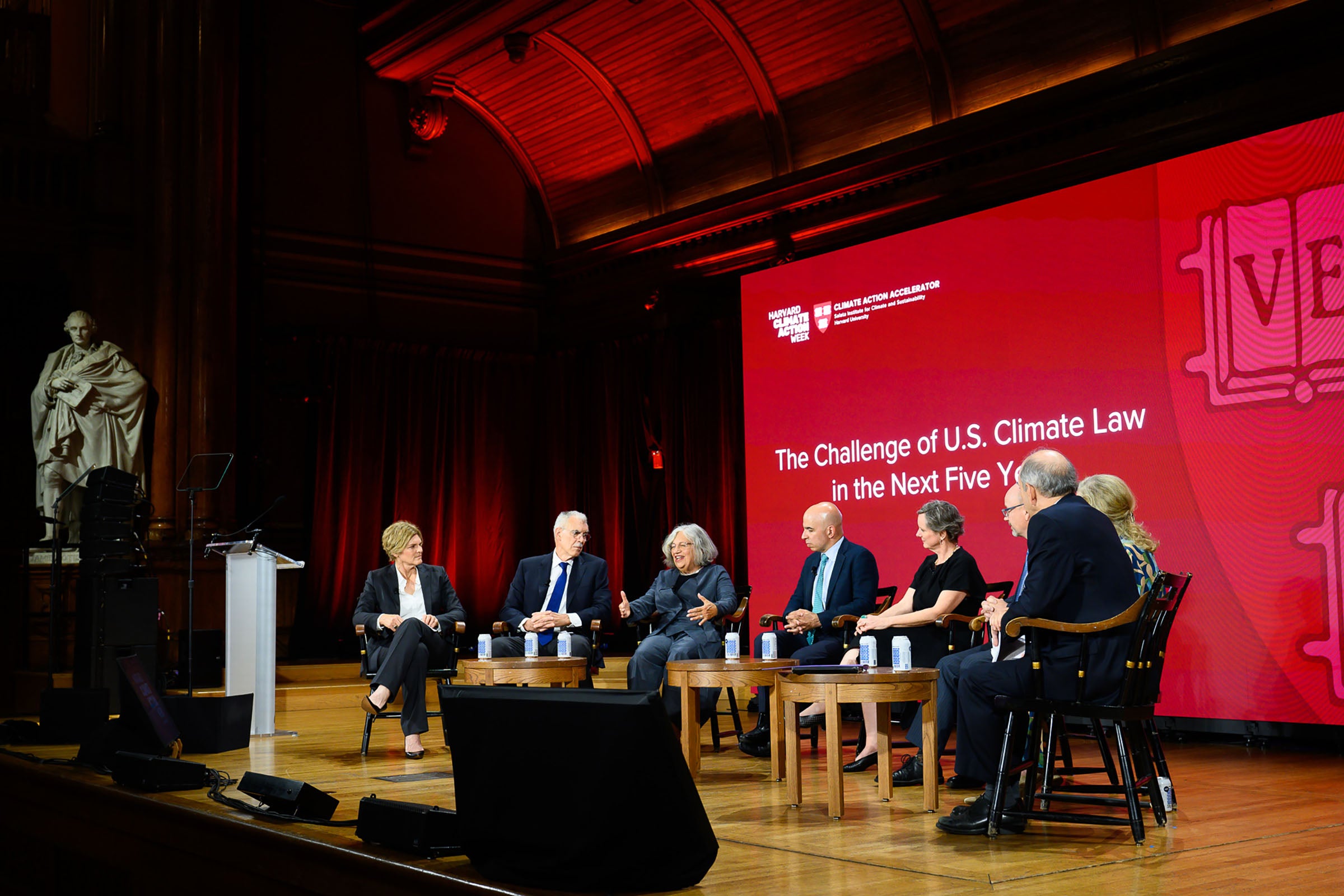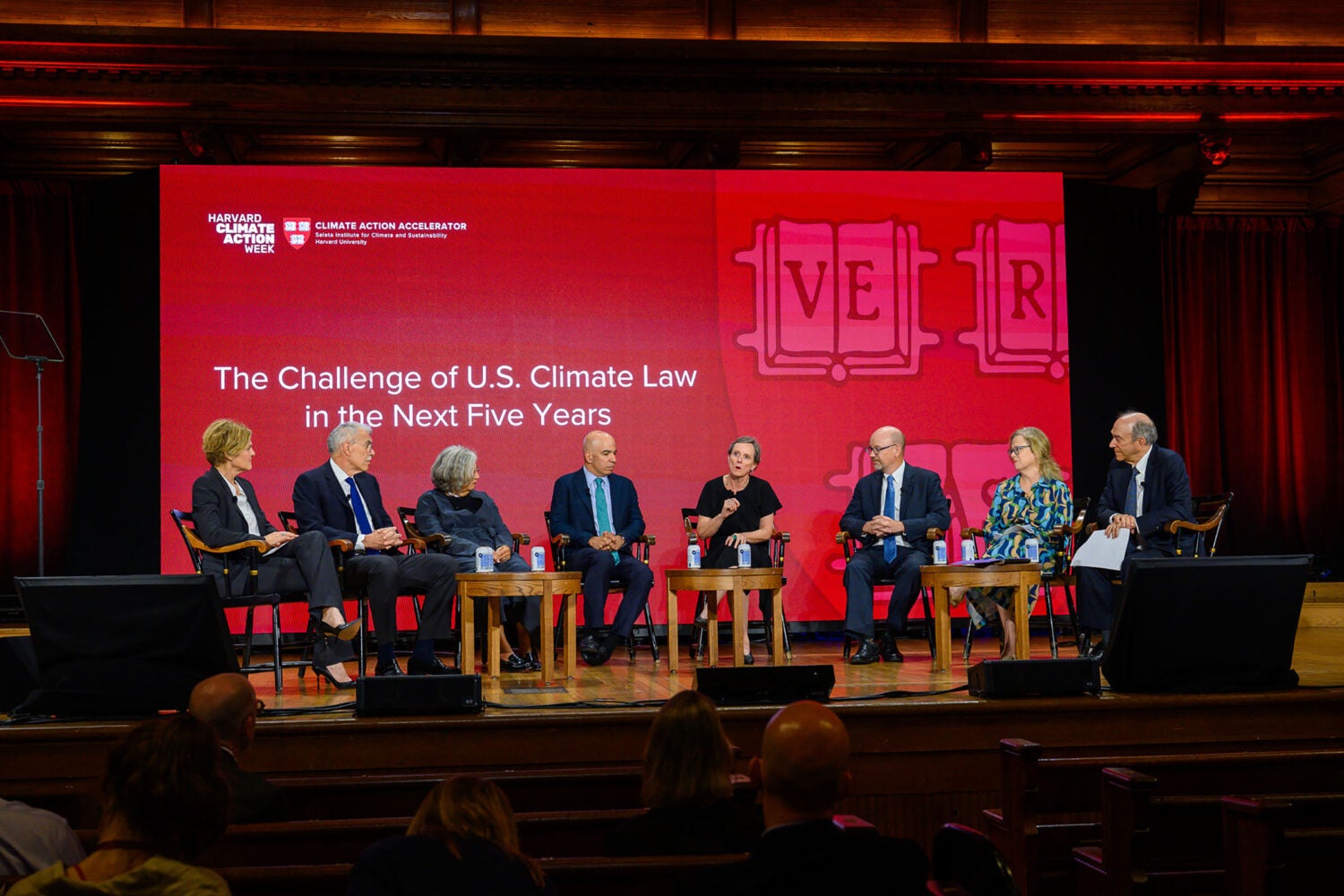The future of United States environmental law may not be as bleak as some environmentalists may fear, according to experts who spoke at Harvard University’s historic Sanders Theatre on June 10 as part of a panel titled, “The Challenges of U.S. Climate Law in the Next Five Years.”
Despite citing what they believe are numerous threats to the environmental movement, particularly from the U.S. Supreme Court, the group of distinguished scholars and government officials also pointed to years of progress that is likely to survive the presidential election, whatever its results.
Moderated by Harvard Law School professors Jody Freeman LL.M. ’91 S.J.D. ’95 and Richard Lazarus ’79, the event was a key part of Harvard’s Climate Action Week, hosted by the Climate Action Accelerator at the Salata Institute for Climate and Sustainability at Harvard University. For the weeklong series, Harvard invited climate experts, leaders, and stakeholders to Cambridge, Massachusetts to explore solutions to the most complex and challenging dimensions of the climate crisis.
“The greatest challenge in the U.S. has been our politics,” said Abigail Dillen, president of the environmental regulatory group Earthjustice. After a long period of stalemate, she argued, “National climate policy is unstuck. We have a president in office who ran on a climate centered platform. We’ve passed historic investments that are building a new clean economy. We’ve seen this past spring an outpouring of regulations of the sort I’ve never seen in my 25-year career.”
Yet, Dillen warned the audience that what she termed the “great politics challenge” remains; namely, the need for organized majorities to demand climate action. “That is going to be the only possible antidote to what I fear is the biggest emerging roadblock, the conservative majority of the Supreme Court,” she said.
Victoria Arroyo, associate administrator for policy at the Environmental Protection Agency, provided further reason for optimism. “This EPA is really knocking it out of the park,” she said, listing Biden administration policies that ranged from tougher emissions standards for passenger cars and light trucks to the recent expansion of electric vehicles (to 62%) in the U.S. Postal Service.
And, she said, there is more to come. “We should be issuing a spring regulatory agenda soon, and there have been commitments made to deal with existing natural gas. We still have to do more on lead and water, and on Superfund sites, but we’re very proud of what we’ve done so far.”
But as Harvard Law’s Lazarus pointed out, attention is shifting to the Supreme Court, which has the power to invalidate pro-climate laws and policies. He asked the panelists whether the Court was likely to be an obstacle to pro-environmental legislation in the future, and the answer from former U.S. Solicitor General Don Verrilli was not a positive one.
“I’d like to be more optimistic, but unfortunately I’m not,” said Verrilli, who served under President Barack Obama ’91 from 2011 to 2016. “The Court is different than it was when I was solicitor general, and I thought I had an incredibly hard job defending the government’s positions, including in the environmental area. And for the current administration, it’s even harder.”

He outlined the dynamic that often plays itself out, starting with political gridlock that prevents Congress from approving new laws to protect the environment. In response, the executive branch will engage in “creative reimagining” of existing statutes to move the climate agenda forward.
But stretching old laws to address new problems causes its own set of problems.
“That’s the very thing that raises this intense suspicion among the conservative justices — that the executive branch is not doing its job in enforcing the law, but supplanting the legislature’s job in making the law,” Verrilli said.
The Court has reacted, he argued, by adopting the relatively novel ‘major questions doctrine,’ which allows the justices to demand that administrators point to clear statutory text in cases in which a regulation addresses what the jurists believe is a matter of great social or political significance.
“That really is a weapon in the hands of the conservative judges,” Verrilli. “They can essentially do whatever they want with it … so they end up having an enormous amount of discretion.”
Pursuing this idea, Lazarus asked if it is pure happenstance that the Court is currently focused on separation of powers, rather than being more deferential to the government as in the past. He asked if this might be another tool the Court would use against environmental regulations.
“I have too many scars on my back to think it’s happenstance,” Verrilli replied.
“I want to tell a darker story,” added co-moderator Jody Freeman. She argued that the pending Corner Post, Inc. v. Board of Governors of the Federal Reserve System case, while unrelated to the environment, is indicative of the Court’s efforts to re-litigate long-settled rules.
“If you piece together a bunch of actions of the Court, it looks like there is something larger going on, that has an anti-regulatory kind of valance, a ‘debilitate government’ framing to it,” she said, before asking panelists if her thesis sounded paranoid, or if she was on to something.
“I don’t think you’re paranoid at all,” replied Greg Dotson, former chief counsel of Senate Environment and Public Works Committee. Although Democrats’ ability to filibuster anti-environmental legislation has prevented Congress from overstepping in recent years, he said there are no such protections against an overreach by the Court.
“Without the filibuster, there’s a chance we would have lost health-based air quality standards, the Endangered Species Act, the authority over greenhouse gases … If the Supreme Court can now pick out provisions it doesn’t like, and under new doctrines decide they’re invalid, you’re not protecting those laws anymore,” Dotson said.
Roger Martella, GE’s chief sustainability officer, saw a silver lining in the 2022 passage of the environmentally friendly Inflation Reduction Act. “These policies are working, and they’re being transformative,” he said. “This is an exciting time for all of us because we’re seeing action.”
Congress, he argued, was also “super smart” about giving the law a ten-year lifespan. “We’re trying to make it apolitical, we’re trying to make sure it resonates with everybody who cares about these topics, whether it’s climate or energy security.”
Freeman brought up presidential candidate Donald Trump’s stated intent to ask Congress to repeal the Biden-era Inflation Reduction Act if elected to a second term. But Dotson said he believes it won’t be quite so easy now that much of the funding is already on its way out the door. “The appropriated dollars will be very difficult to claw back … (and) Congress is very good at not doing things,” he said.
Referencing U.S. Secretary of Energy Jennifer Granholm’s [’87] statement that the Inflation Reduction Act’s future will be “government-enabled, private sector-led,” Martella argued that private industry is under pressure to deliver results.
“In terms of the catalysts and who’s driving this,” he said, “we’ve gone from NGOs [non-governmental organizations] and companies, to employees, investors, customers, who are requiring companies to follow through on these commitments and making decisions on where they’re going to work and invest.”
Further hope for the future lies in at the state level, said Mary Nichols, distinguished counsel of the Emmett Institute on Climate Change and the Environment. “The fact that states can and increasingly do want to play an active role on climate is very heartening and has shown a lot of promise,” she said.
California, Colorado, New Mexico and a few Northeast states have all banded together on environmental issues, and more seem to be following. “Historically, when you have that many states moving ahead,” Nichols argued, “industry may object to the patchwork quilt of regulations but generally has been willing to collaborate, sometimes in very creative ways.”
Wrapping up the hour-long discussion, Harvard Law’s Freeman noted that, despite enduring Supreme Court worries, “this panel has turned out way more optimistic than it could have been.”
Want to stay up to date with Harvard Law Today? Sign up for our weekly newsletter.
